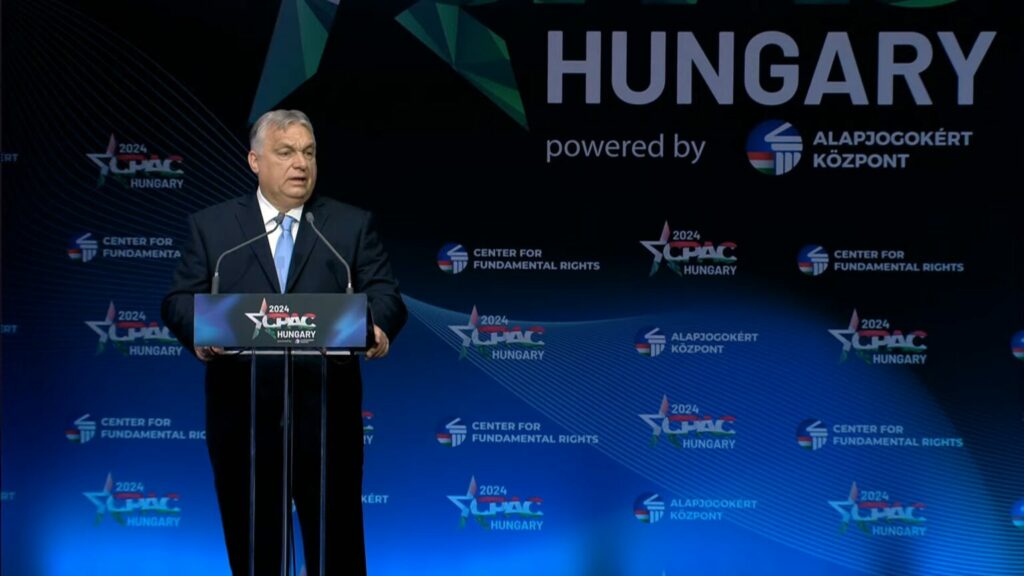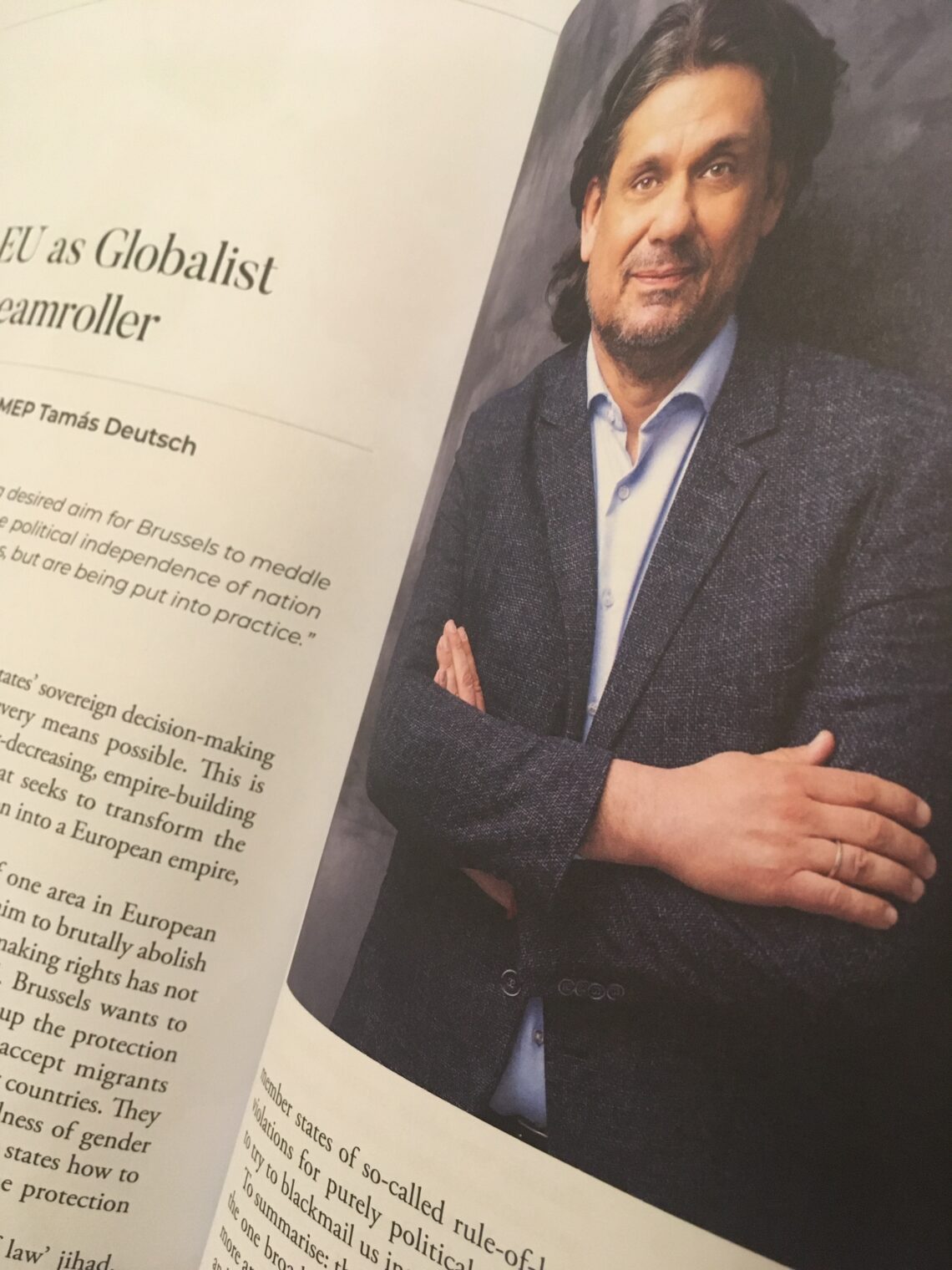The https://english.atlatszo.hu use cookies to track and profile customers such as action tags and pixel tracking on our website to assist our marketing. On our website we use technical, analytical, marketing and preference cookies. These are necessary for our site to work properly and to give us inforamation about how our site is used. See Cookies Policy
CPAC Budapest was fully funded by the Hungarian taxpayer, to the tune of possibly more than 3 million euros
Viktor Orbán’s European political campaign is supported by several organisations that are funded from the state coffers. Out of its publicly funded grant worth more than 11 million euros, the Centre for Fundamental Rights could have spent more than 3 million on CPAC Budapest in April – in effect, a campaign event for Orbán’s party and its friends. The European Conservative, which received 1.8 million euros, prepared a special edition of its magazine for the EP campaign.
When Viktor Orbán welcomed “conservatives from all over the world” at CPAC in Hungary at the end of this April, the audience of hundreds in the grand auditorium of the Millenáris Hall in Budapest was treated to the campaign launch of a leader of a transatlantic political movement. “There will be elections around the world, and we must win those elections,” said the Hungarian prime minister. „Go Donald Trump, go European sovereigntists! Let’s saddle up, let’s arm ourselves, let’s take to the battlefield and let the electoral battle begin.”

The Center for Fundamental Rights was the official host of the Budapest stop of the Conservative Political Action Conference (CPAC), a series of events launched by circles close to the US Republican Party and now held in several countries. The president of the Fidesz-allied think tank, Miklós Szánthó, like the prime minister, struck a political chord in his speech.
“The goal of CPAC Hungary is nothing less than to organise a global coalition of anti-globalist forces,” Szánthó said. “And this year we are moving into action. We must drain the swamp in Brussels in June and in Washington in November.”
The international far-right rally, held in Hungary for the third time, was being shunned this year by the real heavyweights. But important officials from the two European party families important to Orbán, the European Conservatives and Reformists (ECR) and Identity and Democracy (ID), did both represent in Budapest.
While these two radical right-wing parties are not expected to outright replace the current moderate EPP-Social Democrat-Liberal majority, they are still anticipated to gain more clout in the June EP elections. Fidesz, which previously left the moderate right-wing European People’s Party and now sits with Non-Inscrits, aims to organise as large a grouping of radicals as possible around Orbán’s policies by the summer.
During the two days of the CPAC in Budapest, a total of eleven officials from the Orbán government and Fidesz – including EP list leader Tamás Deutsch – took to the stage in front of hopeful allies. No opposition politician was given a similar opportunity at the closed-door event, with the Centre for Fundamental Rights explicitly labelling liberal Momentum’s Katalin Cseh an “undesirable person” in a Facebook post. As in previous years, the registration requests of several press organisations that are not friendly to Fidesz were rejected – this time with mocking responses.
The Centre for Fundamental Rights could have spent up to HUF 1.15 billion – fully funded from the national budget – on the conference, which provided campaigning opportunities for Fidesz politicians. The sum is the equivalent of more than 3 million euros. The Institute received the money as a grant through the Lajos Batthyány Foundation (BLA). According to the documents, the intensity of the grant is 100 percent, meaning that the Center does not need to come up with even one euro on its own to cover its event-related costs.
More than 11 million euros for 2024
Through a freedom of information request, Atlatszo has obtained access to the latest grant documents between the BLA and the Rule of Law and Justice Nkft., which operates the Centre for Fundamental Rights. According to the documents, the analytical institute receives a total of the equivalent of more than 11 million euros in funding for the year 2024, including a total of more than 3 million euros for holding events.
The documents show that from this amount, the Centre for Fundamental Rights will have to organise the CPAC in Budapest and at least 9 other smaller events – workshops, press breakfasts and the like – during 2024. It is not clear from the documents exactly how much of the total is meant for CPAC, but it stands to reason that smaller events should cost several orders of magnitude less than the international get-together. The Fundamental Rights Centre did not reply to our question on the matter.
In previous years, the Centre for Fundamental Rights received less than the current allocation to organize events: 1 million euros for 2022 and more than 2 million euros for 2023 from BLA. In both years, the Institute co-organised a CPAC conference in Budapest.
Since 2021, BLA legally belongs to a special cohort of foundations named “public trust funds performing a public function”. According to the law establishing this special category, BLA and other public trusts “perform a public function independently of any government” and therefore need to be funded by the state. The Prime Minister’s Cabinet Office gave more than 23 million euros to BLA last year and more than 27 million euros this year, most of which is transferred to more Fidesz-allied organisations as grants.
A special foundation just for one party
Political foundations like an earlier iteration of the BLA – it was always close to Fidesz but used to operate as a regular, private foundation – operate in some form in many countries. In Hungary, this role for a long time was almost exclusively played by another set of special entities: so-called “party foundations”, which were modelled after Germany’s Parteinahe Stiftungen and introduced in the 2000s.
Under the Hungarian system, these organisations are entitled to funding from the national budget to the extent of their parent party’s election results. Party foundations in turn spend the funding on party-related research institutes, organisations and media. Like all Hungarian parties in parliament, Fidesz has such a party foundation, the Alliance for a Civic Hungary Foundation (SZPMA).
BLA however, which is funded by public money on the grounds of public interest and whose spending favours Fidesz-allied initiatives, has no opposition counterpart. Moreover, this organisation now has a budget that dwarfs the annual income of even the largest party foundation.
Whereas ten years ago, Fidesz’s party foundation SZPMA had to fund both the Centre for Fundamental Rights and the BLA, the balance of funding power has since been reversed. The SZPMA received about 3.9 million euros from the state coffers in 2022, the most recent year for which it has published a financial report. From this amount, the Fidesz party foundation could not pay even half of what the BLA spent from public funds to support the Centre for Fundamental Rights this year.
BLA-funded organisations go international
A common feature of several organizations that receive significant amounts of BLA funding year after year is that they also support Fidesz’s alliance-building efforts in the international arena. Besides the Center for Fundamental Rights, these include the Scruton chain of cafés – which had been formerly planning to establish a Warsaw outlet – the Institute for Research On Drugs, which, according to recent grant documents, plans to enter the international scene of the research on drugs, and the organisation behind the English-language magazine and news site The European Conservative.
Several of these organisations are now active in the European campaign alongside Fidesz and Orbán. The European Conservative and the Danube Institute – which is a research institute within the BLA – have already appeared in the international campaign before the Budapest CPAC. Sponsored by the two organisations, the conference in Brussels would have featured Viktor Orbán and ended in scandal. The Hungarian prime minister even referred to the Belgian case in his opening speech at the CPAC.
The European Conservative – which, according to documents relating to some of its previous grants, exists to create “European conservative communities” – has also prepared a special EP election publication for the campaign. The magazine’s production quality is impeccable, but its content conforms very closely to Fidesz’s strategies. Titled The Stakes, the magazine features interviews with a total of nine current MEPs, including four ID and three ECR politicians, alongside Tamás Deutsch, and Patrick Breyer of the German Pirate Party, who sits with the Greens in EP.
While the 20-euro publication was available for purchase at the publisher’s stand at CPAC in Budapest, its publisher need not fear financial loss from lack of sales. According to funding documents obtained by Átlátszó, European Conservative Nkft. has received a grant worth 1.8 million euros from the BLA to cover its costs for 2024. In addition to print and online editions and maintaining the editorial office in Brussels, the money will also be used to enable staff to attend international conferences “to promote the magazine”.
Written and translated by Márton Sarkadi Nagy. The original, Hungarian version of this story is available here.
Share:
Your support matters. Your donation helps us to uncover the truth.
- PayPal
- Bank transfer
- Patreon
- Benevity
Support our work with a PayPal donation to the Átlátszónet Foundation! Thank you.
Support our work by bank transfer to the account of the Átlátszónet Foundation. Please add in the comments: “Donation”
Beneficiary: Átlátszónet Alapítvány, bank name and address: Raiffeisen Bank, H-1054 Budapest, Akadémia utca 6.
EUR: IBAN HU36 1201 1265 0142 5189 0040 0002
USD: IBAN HU36 1201 1265 0142 5189 0050 0009
HUF: IBAN HU78 1201 1265 0142 5189 0030 0005
SWIFT: UBRTHUHB
Be a follower on Patreon
Support us on Benevity!


